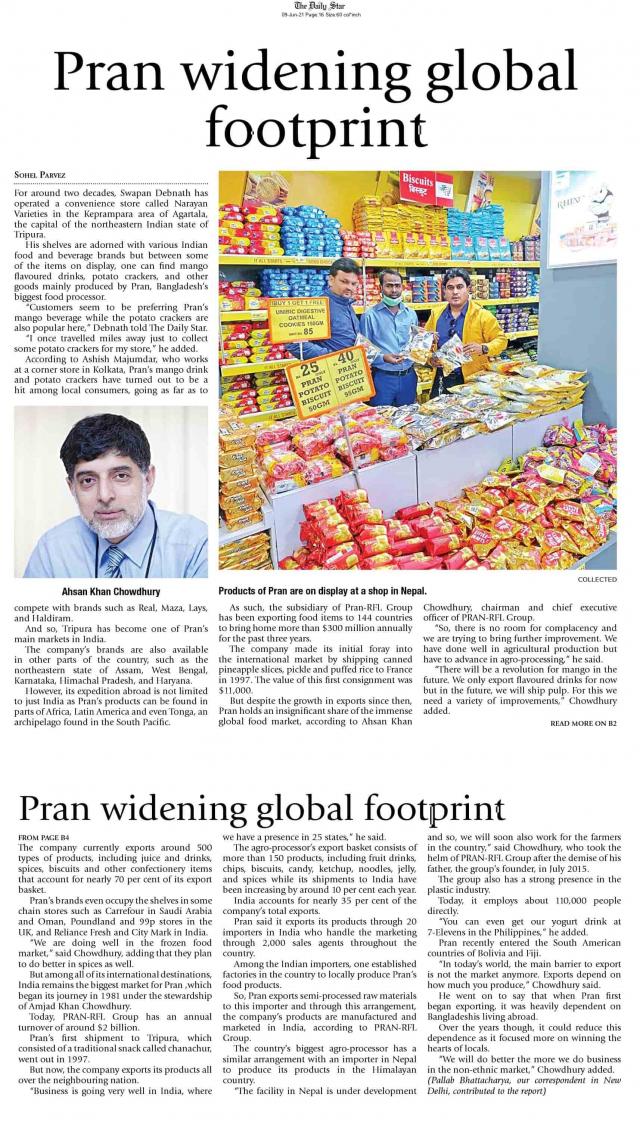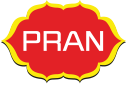Pran widening global footprint

For around two decades, Swapan Debnath has operated a convenience store called Narayan Varieties in the Keprampara area of Agartala, the capital of the northeastern Indian state of Tripura. His shelves are adorned with various Indian food and beverage brands but between some of the items on display, one can find mango flavoured drinks, potato crackers, and other goods mainly produced by Pran, Bangladesh's biggest food processor.
"Customers seem to be preferring Pran's mango beverage while the potato crackers are also popular here," Debnath told The Daily Star.
"I once travelled miles away just to collect some potato crackers for my store," he added. According to Ashish Majumdar, who works at a corner store in Kolkata, Pran's mango drink and potato crackers have turned out to be a hit among local consumers, going as far as to compete with brands such as Real, Maza, Lays, and Haldiram. And so, Tripura has become one of Pran's main markets in India. The company's brands are also available in other parts of the country, such as the northeastern state of Assam, West Bengal, Karnataka, Himachal Pradesh, and Haryana. However, its expedition abroad is not limited to just India as Pran's products can be found in parts of Africa, Latin America and even Tonga, an archipelago found in the South Pacific. As such, the subsidiary of Pran-RFL Group has been exporting food items to 144 countries to bring home more than $300 million annually for the past three years.
The company made its initial foray into the international market by shipping canned pineapple slices, pickle and puffed rice to France in 1997. The value of this first consignment was $11,000. But despite the growth in exports since then, Pran holds an insignificant share of the immense global food market, according to Ahsan Khan Chowdhury, chairman and chief executive officer of PRAN-RFL Group. "So, there is no room for complacency and we are trying to bring further improvement. We have done well in agricultural production but have to advance in agro-processing," he said.
"There will be a revolution for mango in the future. We only export flavoured drinks for now but in the future, we will ship pulp. For this we need a variety of improvements," Chowdhury added. The company currently exports around 500 types of products, including juice and drinks, spices, biscuits and other confectionery items that account for nearly 70 per cent of its export basket. Pran's brands even occupy the shelves in some chain stores such as Carrefour in Saudi Arabia and Oman, Poundland and 99p stores in the UK, and Reliance Fresh and City Mark in India. "We are doing well in the frozen food market," said Chowdhury, adding that they plan to do better in spices as well. But among all of its international destinations, India remains the biggest market for Pran ,which began its journey in 1981 under the stewardship of Amjad Khan Chowdhury. Today, PRAN-RFL Group has an annual turnover of around $2 billion. Pran's first shipment to Tripura, which consisted of a traditional snack called chanachur, went out in 1997. But now, the company exports its products all over the neighbouring nation. "Business is going very well in India, where we have a presence in 25 states," he said. The agro-processor's export basket consists of more than 150 products, including fruit drinks, chips, biscuits, candy, ketchup, noodles, jelly, and spices while its shipments to India have been increasing by around 10 per cent each year. India accounts for nearly 35 per cent of the company's total exports. Pran said it exports its products through 20 importers in India who handle the marketing through 2,000 sales agents throughout the country. Among the Indian importers, one established factories in the country to locally produce Pran's food products. So, Pran exports semi-processed raw materials to this importer and through this arrangement, the company's products are manufactured and marketed in India, according to PRAN-RFL Group.
The country's biggest agro-processor has a similar arrangement with an importer in Nepal to produce its products in the Himalayan country. "The facility in Nepal is under development and so, we will soon also work for the farmers in the country," said Chowdhury, who took the helm of PRAN-RFL Group after the demise of his father, the group's founder, in July 2015. The group also has a strong presence in the plastic industry. Today, it employs about 110,000 people directly. "You can even get our yogurt drink at 7-Elevens in the Philippines," he added. Pran recently entered the South American countries of Bolivia and Fiji. "In today's world, the main barrier to export is not the market anymore. Exports depend on how much you produce," Chowdhury said. He went on to say that when Pran first began exporting, it was heavily dependent on Bangladeshis living abroad. Over the years though, it could reduce this dependence as it focused more on winning the hearts of locals. "We will do better the more we do business in the non-ethnic market," Chowdhury added.
 Pran Foods
Pran Foods


